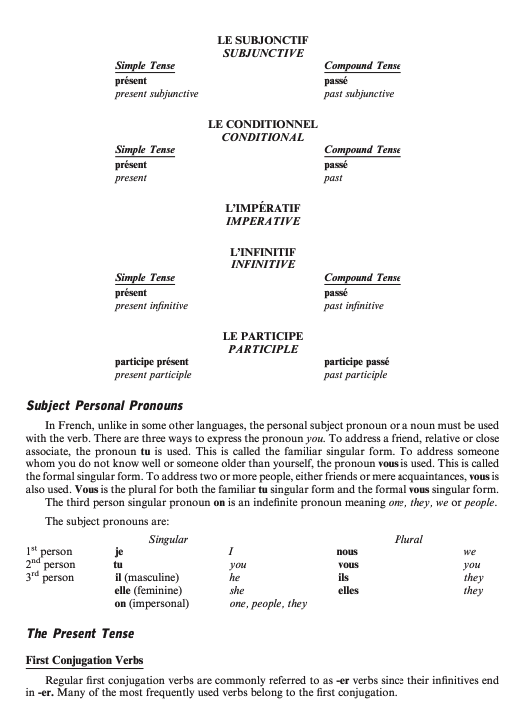French 1 Grammar Notes
Summary:
The “French 1 Grammar Notes” note provides an explanation and examples of key grammar topics in French, including the Present Tense, Pronominal Verbs (Reflexive Verbs), and Passe Compose. The note offers comprehensive explanations of each topic, accompanied by practice exercises and answers for reinforcement.
The note acknowledges that French verbs may initially appear difficult for native English speakers. However, it reassures learners that French verbs can be understood and learned through conjugations or classes, where verbs that are formed similarly are grouped together. This approach simplifies learning verb forms, including irregular verbs with common characteristics.
The note introduces different moods and tenses in French. The indicative mood is used to express facts and events, making it the most frequently used mood in conversation. The subjunctive mood expresses feelings, opinions, doubts, and subjective conditions. The conditional mood expresses verbs tied to a condition, while the imperative mood is used for commands, orders, or wishes.
The note further explains the infinitive form of verbs, which has a fixed ending, and the participle form, which can function as a verb or an adjective. It then proceeds to delve into the Indicative mood, which includes simple tenses (present, imperfect, future, and literary past) and compound tenses (present conversational past, pluperfect, future perfect, and past perfect).
The note emphasizes the importance of understanding different moods and tenses in French, as they provide insight into the speaker’s viewpoint and the timing of events. It clarifies that while moods relate to the aspect of the verb, tenses indicate the time of the action. Simple tenses consist of a single word, while compound tenses involve an auxiliary (helping) verb and a past participle.
Excerpt:
French 1 Grammar Notes
CHAPTER 1
Verbs
French verbs at first appear to be difficult to the native English speaker, but they are not as difficult as they appear. Fortunately, each verb is not unique; it does not function as an entity. Many verb forms can similarly be grouped together in classes or conjugations. This greatly facilitates learning verb forms. As you will observe in subsequent parts of this chapter, even many so-called irregular verbs have characteristics in common.


Reviews